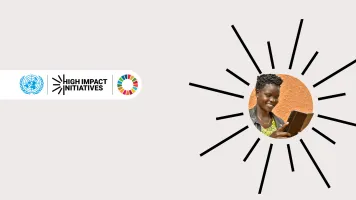In September 2023, we convened a fantastic array of speakers and partners to launch the Power of Data High Impact Initiative at United Nations HQ.
The goal of the High Impact Initiative is to unlock new data sources, technologies, and investment to drive progress towards the Sustainable Development Goals (SDGs). To achieve this, the plan is to create 30 national data partnerships by September 2024, that will revolutionize decision making, accelerate countries’ digital transformation agendas, and open up economic opportunities, for a more equal and sustainable world.
Just over six weeks from the launch of the initiative in New York, early movers gathered at Festival de Datos in Uruguay to take their first concrete steps together.
In a four-hour workshop, representatives from nearly all of the initial 15 countries* launching national data partnerships met to share priorities, opportunities, challenges and inspiring solutions. Together with the initiative’s co-leads – the Global Partnership, UNDP, UNFPA, UNDESA, UNICEF, CCS-UN and the World Bank – participants identified a set of concrete actions to be taken at a national and global level, to ensure the national data partnerships become a powerful reality.
This was a powerful start for the partnerships that – driven by strong political leadership at a national level – will bring together governments, tech companies, civil society, donors and others to build on existing initiatives to strengthen the use of data and drive progress on the SDGs and other development agendas.
Actions to drive forward the national data partnerships
Through a series of breakout discussions, delegates identified the key actions to take at both the national and global level, to ensure the national data partnerships are a success.
The actions at a national level included:
- Expanding support for capacity strengthening, particularly in supporting policy makers to build the skills needed to use predictive AI to solve policy challenges;
- Strengthening partnerships – not just between government, private sector and CSOs – but also internally, among government agencies and departments;
- Building stronger relationships with the private sector that will allow governments to learn what works, at pace;
- Improving the visibility of national statistical systems – a specific suggestion was to establish a national, pooled fund for data and statistics if and where relevant.
At the global level, there was strong consensus that the Power of Data needs to become an initiative that has strong recognition and momentum. This is essential to attract political support and will at the highest levels of national government, such as by presidents and finance ministers.
Other actions at the global level included:
- Enabling and encouraging the private sector to share the data they hold in safe and responsible ways, and cross-country exchange of what works to convince and engage private companies on data sharing;
- Securing financial support for the initiative and national data partnerships;
- Rallying support for countries to strengthen capacity in data skills, such as AI and machine learning;
- Channeling support for countries to acquire high-quality equipment and infrastructure, such as cloud-based and powerful computing systems;
- Fostering synergies and alignment across global data initiatives to break down silos.
Collaboration, capacity building and infrastructure
To reach the actions outlined above, delegates heard from three panels, featuring leaders from across the national data partnership countries.
The first panel focused on improved partner collaboration. Delegates shared insights from a range of efforts, including bringing together large numbers of government agencies to share and report on SDG progress, to National Statistical Organizations forming a data lab in order to drive forward SDG progress across government.
The second panel focused on human resources, capacity building and quality of statistics. Discussions centered around the challenges many countries are facing in attracting and retaining statisticians and data scientists in the public sector, and the subsequent skills gaps that this exacerbates. Panelists also spoke about the risk of cyber attacks and the challenges of big data. This included the need, for example, to encourage private sector companies to share the data they hold on citizens, so it can be used to inform decisions.
The third panel’s theme centered on infrastructure, equipment and information technology. Speakers discussed the use of census data and non-traditional approaches to surveys. Remarks also focused on the uneven development of statistical systems and capacities between national and sub-national levels.
What next?
At the end of the session, delegates reviewed a summary statement, outlining key principles for the Power of Data initiative, which will soon be made available.
It includes a commitment – within six months of joining the Power of Data initiative – for countries to establish a national data partnership with a coordination framework or leveraging a national mechanism for coordination that already exists. This will be led by a senior political figure, such as the Minister of Finance or Planning, and will bring together the relevant parts of government and external stakeholders. This group will focus on mapping existing priorities, strategies and initiatives on data and identifying synergies, establishing needs, and proactively facilitating partnerships that encourage all members to work in a coordinated way.
At the global level, development partners commit to align assistance with national data partnerships and allocate resources to deliver on those priorities. There will be ongoing efforts to mobilize funding for the initiative from potential donors, to ensure the sustainability and growth of the partnerships.
Following a short period of review, the national data partnership countries are expected to sign up to the outcome statement, as we embark on our collective journey towards unlocking the data dividend for the Sustainable Development Goals.
The High Impact Initiatives will reconvene at the High-Level Political Forum in July 2024. This is a key milestone at which all participating countries will have the opportunity to demonstrate progress and leadership in advancing national data partnerships.
If you are a Minister, official, or represent a country looking to launch or support national data partnerships and would like to find out more, please contact [email protected]
If you are from the UN system, a foundation, a tech or other company, or civil society and would like to find out more about how you can support the national data partnerships please contact [email protected]
* Participating countries were: Bangladesh, Botswana, Cabo Verde, Colombia, Costa Rica, Dominican Republic, Ghana, Kenya, Nigeria, Paraguay, Togo, Uruguay. The other Power of Data countries that were not able to attend are: Democratic Republic of the Congo, Rwanda, Somalia.
Photos of the Power of Data High Impact Initiative workshop at Festival de Datos. Photo credit: Pablo Kreimbuhl

